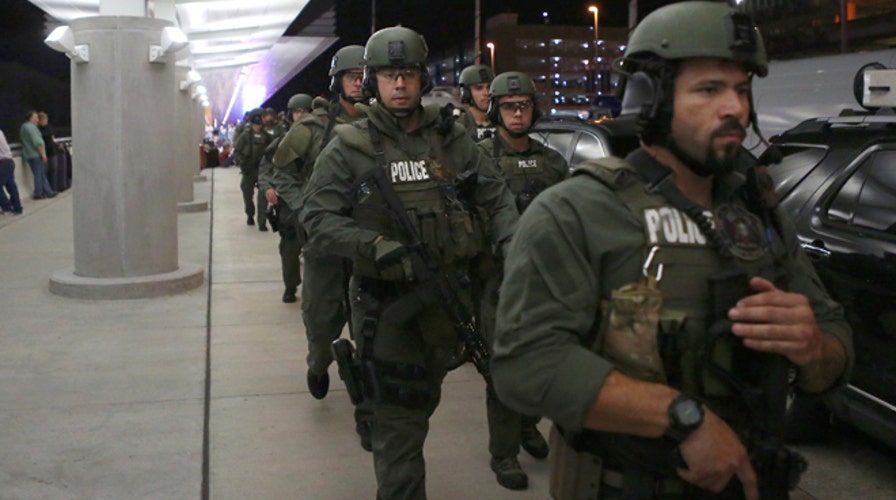Social Security agency pushes gun control effort
Strategy Room: David Mercer and Brad Blakeman weigh in on the Social Secuity Administration's push to vet gun buyers based on mental illness records
Second Amendment advocates hope President-elect Donald Trump will reverse a new rule by the outgoing Obama administration under which the Social Security system could be used to block gun purchases for thousands of benefit recipients.
“We’ve already made the request to the Trump administration to look at repealing this,” Erich Pratt, executive director of Gun Owners of America, told FoxNews.com.
The Social Security Administration finalized a rule in December under which the agency would submit information to the National Instant Criminal Background Check System (NICS) on recipients of disability insurance and Supplemental Security Income (SSI) if the government determines they are “mental defectives,” and unable to manage their own affairs.
Gun control groups insist the government should take action to keep guns away from the mentally ill, citing the recent airport shooting in Fort Lauderdale. But critics of the SSA rule contend the system could use overly broad criteria to end up denying guns to “harmless, law abiding” people with no history of violence.
One concern is how a similar program has worked at the Department of Veterans Affairs, which has been reporting some veterans to the background check system when they have been unable to manage their own financial affairs. The VA reported the names of more than 257,000 military veterans who couldn’t manage their finances. A 2012 Congressional Research Service report found 99.3 percent of all names reported on the background check system as “mental defectives” came from the VA.
“Now it will be the same premise with Social Security if grandpa has trouble paying the bills,” Pratt said.
The SSA change was months in the making. President Obama’s White House announced a package of executive actions in January 2016 that said, “The Social Security Administration has indicated that it will begin the rulemaking process to include information in the background check system about beneficiaries who are prohibited from possessing a firearm for mental health reasons.” The rule was not finalized until Dec. 19.
Kate Folmar, spokeswoman for Everytown for Gun Safety, an advocacy group founded by former New York Mayor Michael Bloomberg, said this is part of a larger push to ensure the mentally ill don’t obtain weapons.
“Certainly the Fort Lauderdale shooting incident highlights that more can be done to keep guns out of dangerous hands,” Folmer told FoxNews.com. “For example, four states -- Connecticut, Indiana, California and most recently Washington State -- have laws on the books that allow family members and law enforcement to petition courts to remove someone's weapons if he is a threat to himself or others; these laws include specific provisions to protect the individual's right to due process.”
The new rule is meant to comply with the 2007 NICS Improvement Amendments Act, which requires federal agencies to provide relevant information to the Justice Department for inclusion in the background check system, SSA spokesman Darren Lutz told FoxNews.com.
“This is why Social Security is planning to refer the records of affected individuals to the NICS, in accordance with the policies described in the regulation,” Lutz said. “Social Security will not refer the records of all Social Security beneficiaries to the NICS database.”
Specifically, the regulation affects anyone from 18 years old through retirement age who qualifies for disability because of a “mental impairment” that prevents the person from working who must have a “representative payee” for handling their finances, Lutz said.
According to the rule, if Social Security first determines that someone else is handling a person’s financial affairs, it will look at whether the person is mentally impaired. The rule states, “at the commencement of the adjudication process we will also notify individuals, both orally and in writing, of their possible federal prohibition on possessing or receiving firearms, the consequences of such prohibition, the criminal penalties for violating the Gun Control Act, and the availability of relief from the prohibition on the receipt or possession of firearms imposed by federal law.”
This will affect “tens of thousands of harmless, law-abiding people,” who will lose a constitutional right without due process, according to the National Rifle Association, which also plans to ask the incoming Trump administration to take “corrective action” on the matter.
“At no point in the actual ‘adjudication’ is the individual’s propensity for violence a necessary consideration,” said an NRA statement issued after the rule was finalized. “Rather, the question ultimately devolves to whether or not the individual has any sort of mental condition and can responsibly handle money, which is not a fair basis to strip someone of their constitutional rights.”
In July, Elizabeth Avore, legal director for Everytown for Gun Safety, expressed support for the regulation in a letter during the public comment period.
“Everytown applauds the White House for a set of recent executive actions aimed at improving the gun background check system and giving law enforcement tools to combat gun trafficking,” Avore’s letter said. “Those actions included initiating this rulemaking process, which seeks to bring the SSA in line with the NICS Improvement Amendments Act of 2007 ('the NIAA') requirement that federal agencies submit prohibiting records into NICS.”





